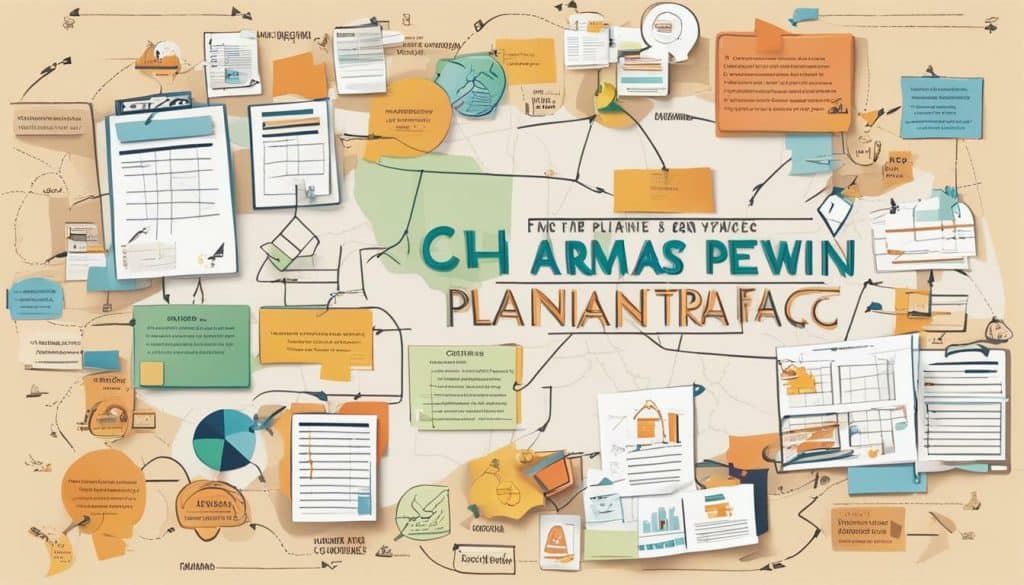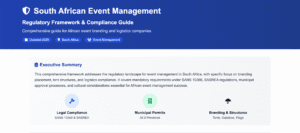Planning events requires meticulous attention to detail, creativity, and organization. It involves a structured approach that starts with understanding the first process of event management. This initial stage lays the foundation for planning successful events in South Africa by focusing on event conceptualization, design, coordination, and logistics.
Event planning involves identifying the purpose and objectives of the event, defining the target audience, and identifying the resources required. The first step of event management is to conceptualize the event and design a plan that will help achieve the desired outcomes. This includes determining the event theme, selecting the appropriate venue, and creating a budget.
Key Takeaways
- Understanding the first process of event management is crucial for planning successful events.
- The first step involves event conceptualization and design, including determining the event’s purpose, theme, and target audience.
- Effective event planning requires meticulous attention to detail, creativity, and organization.
Event Conceptualization and Design
Planning an event is a collaborative effort that involves a lot of creative thinking, hard work, and attention to detail. The first phase of event management involves conceptualizing and designing the event’s purpose, theme, and target audience. This includes deciding on the type of event, what it should achieve, and what kind of guests you want to attract.
Event conceptualization involves brainstorming ideas and selecting a theme that is impactful and memorable. It is essential to ensure that your theme aligns with the event’s purpose and resonates with your target audience. Once you have decided on a theme, you can begin designing the event’s creative elements, including lighting, decor, signage, and overall aesthetic.
Event design is an art form that combines creativity and practicality. It is crucial to create a cohesive and visually pleasing event that not only looks good but also functions well. This means considering issues such as traffic flow, seating arrangements, and accessibility, as well as designing engaging activities and entertainment to keep guests entertained.
Event Purpose and Objectives
The purpose of an event is a crucial factor in conceptualizing and designing a successful event. Knowing what you hope to achieve will help you shape the event’s theme and guide your design choices. For example, if the event’s goal is to raise funds for a charity, it might be appropriate to choose a theme that inspires generosity and giving. Alternatively, if the aim is to launch a new product, the theme could reflect the product’s features and benefits.
Creative Design Elements
There are many creative design elements that can contribute to a successful event. From lighting and sound to decor and stage design, each element should work together to create an immersive experience for guests. It is essential to consider the guest experience and design the event’s elements to engage and delight attendees.
Effective use of colour, lighting, and textures can create a unique and memorable atmosphere that reflects the event’s theme and purpose. Signage and branding are also critical elements of event design, helping to create a strong visual identity that guests will remember long after the event has ended.
Moreover, entertainment and activities are essential elements of event design, providing guests with engaging and exciting experiences that they will remember for a long time. This can include anything from live music and performances to interactive workshops and demonstrations.
It’s essential to work with a team of professionals who can help you create the perfect event design that brings your vision to life. By engaging with an expert event design team, you can create an unforgettable event that guests will be talking about for years to come.
Event Coordination and Logistics
Effective event coordination and logistics are critical to the success of any event. The planning process requires meticulous attention to detail, and event organizers must work closely with vendors, suppliers, and other stakeholders to ensure a seamless execution of the event.
Choosing the right venue is one of the most crucial aspects of event planning. Event organizers must consider factors such as the size of the venue, location, and facilities available. They must also ensure that the venue complies with all health and safety regulations and has adequate parking, catering, and restroom facilities for attendees.
| Key elements of event coordination and logistics: | Description: |
|---|---|
| Staffing | Ensuring adequate staffing levels and appropriate training for staff to carry out their roles effectively. |
| Resource allocation | Allocating resources such as equipment, technology, and materials to various parts of the event. |
| Transportation | Planning and coordinating transportation for attendees, speakers, and VIPs. |
| Budget management | Developing and managing the budget for the event, including forecasting revenues and expenses. |
Event organizers must also ensure that all necessary permits and licenses are obtained, and all legal requirements are met. They must develop a detailed event plan that outlines the event schedule, vendor management, and contingency plans in case of unforeseen circumstances.
Communication and collaboration are essential for successful event coordination and logistics. Event organizers must work closely with all stakeholders, including vendors, sponsors, and attendees, to ensure everyone is on the same page and that the event runs smoothly. Effective communication can help to mitigate risks and avoid potential problems.
By paying attention to detail and following a structured approach to event coordination and logistics, organizers can ensure a seamless and successful event that meets the needs of attendees, sponsors, and stakeholders.
The Role of Event Organising
Event organising is a critical aspect of the first process of event management. It involves creating a detailed event plan and ensuring that all aspects of the event are meticulously planned and executed. The following are some of the responsibilities involved in event organising:
| Task | Description |
|---|---|
| Scheduling | The event organiser is responsible for creating a detailed timeline for the event. This includes scheduling all activities, including the set-up and tear-down of the event. |
| Vendor management | The organiser must coordinate with vendors to ensure that all equipment, supplies, and services are delivered on time and meet the event’s requirements. |
| Permits and licenses | The organiser must ensure that all necessary permits and licenses are obtained for the event, including liquor licenses, noise permits, and zoning permits. |
| Communication and coordination | The organiser must communicate effectively with all stakeholders involved in the event, including the event team, vendors, sponsors, and attendees. This includes providing regular updates and ensuring that everyone is aware of their roles and responsibilities. |
Event organising requires attention to detail and effective communication skills. By being well organised and thorough, event organisers can ensure that all aspects of the event are executed smoothly and that attendees have a memorable experience.
Conclusion
In conclusion, understanding the first phase of event management is fundamental to planning successful events in South Africa. By following a structured approach and paying attention to detail, event organizers can ensure the smooth execution of events that leave a lasting impression on attendees.
From event conceptualization and design to event coordination and logistics, each step plays a significant role in creating memorable experiences. The event management process is a highly detailed and organized approach that requires meticulous planning, effective communication, and coordination with all stakeholders involved.
When it comes to the first phase of event management, it is paramount to establish the event’s purpose, theme, and target audience. Creative and innovative design elements are essential to creating a unique and memorable event experience. Equally important is the coordination and management of logistics, from selecting the right venue to managing resources, staffing, and budgets.
Effective event organizing is key to creating a detailed event plan, including scheduling, vendor management, and obtaining all necessary permits and licenses. The role of an event organizer is to ensure that all aspects of the event are taken care of, and all stakeholders are informed and satisfied.
Plan and Execute with Precision
By understanding the first phase of event management, event organizers can work towards creating a seamless, stress-free event that meets all stakeholder expectations. With careful planning and attention to detail, event management can be a highly rewarding and successful undertaking.
What is the First Stage in Event Management Planning?
The first stage in event management planning is establishing the objectives and goals of the event. This initial step is vital as it sets the foundation for the succeeding stages of the seven stages of event management. It involves defining the purpose, desired outcomes, and target audience, which serves as a guide throughout the planning process.
What Are the Steps Involved in the Event Execution Process?
Event execution best practices involve several essential steps. Firstly, meticulous planning is crucial to ensure all aspects of the event are carefully considered and accounted for. Next, securing a suitable venue and coordinating logistics play a vital role in a smooth execution. Effective communication with all stakeholders, including vendors and attendees, is imperative. Additionally, the use of technology and innovative solutions can enhance event experiences. Finally, conducting a thorough evaluation and debriefing post-event helps identify areas for improvement and ensures continuous growth.
FAQ
Q: What is event management?
A: Event management is the process of planning, organizing, and executing events, such as conferences, weddings, corporate gatherings, and festivals, to ensure they are successful and memorable.
Q: What is the first step in event management?
A: The first step in event management is event conceptualization and design, where the purpose, theme, and target audience of the event are established, along with the creative design elements that contribute to its success.
Q: What is event coordination?
A: Event coordination involves all the essential aspects of planning and executing an event, including venue selection, budget management, logistics, staffing, and resource allocation, to ensure the event runs smoothly.
Q: What is the role of event organizing?
A: Event organizing plays a crucial role in the first process of event management. It includes creating a detailed event plan, scheduling, vendor management, and obtaining all necessary permits and licenses. Effective communication and coordination with all stakeholders are also important.
Q: Why is understanding the first process of event management important?
A: Understanding the first process of event management is crucial for planning successful events. It ensures that the purpose, target audience, and creative elements of the event are well-defined. It also helps in coordinating logistics, managing the budget, and communicating effectively with all stakeholders involved.




